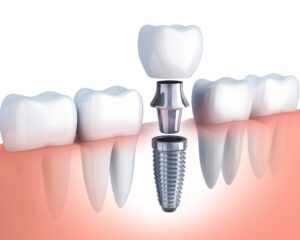Dental Implants in Lawrenceville
What are Dental Implants?
Dental implants are a permanent, fixed solution for replacing missing teeth. Unfortunately, some people may lose a tooth or two throughout life. The loss of a tooth may seem like no more than a cosmetic issue, but the effects of lost teeth can impact your overall oral health.

Benefits of Implants
Implants mimic the feel, form and function of your natural tooth better than any other restorative options. They have a very high success rate in healthy adults and are built to last. Overall, they improve your ability to eat, speak, and smile more confidently.
Schedule a Dental Implant Consultation
If you would like to know if you are a good candidate for implants, contact Sequoia Smiles today. 770-339-0101
Treatment Process For Dental Implants
- Get a consultation – Dr. Vinh with assess your gum and bone health and determine if implants is right for you. Any diseased gum or teeth will have to be addressed prior to surgery.
- Pre-Op – we would take necessary x-rays (possibly 3-D image) and impressions of your mouth
- Surgery Day – single or multiple implants will be placed. Depending on the situation, a surgical guide will be used to better facilitate the implant placement
- Healing Process – it takes about 3-6 months for implants to heal and integrate with your own bone
- Restoring the implant – after the implant has successfully healed, we will restore the implant (s) with a crown, bridge or denture.
Frequently Asked Questions
The longevity of dental implants is one of the many reasons they have become a popular solution for missing teeth. With proper care and maintenance, dental implants can last a lifetime. The implant itself, which is made of titanium, integrates with the jawbone and can last for decades. The crown, which is the visible part of the implant, typically lasts 10-15 years before it may need replacement due to normal wear and tear. However, the lifespan of a dental implant can be influenced by several factors, including the patient’s oral hygiene, overall health, and lifestyle habits such as smoking.
Caring for your dental implants is very similar to caring for your natural teeth, but with a few important considerations:
- Daily Oral Hygiene:
- Brush at least twice a day using a soft-bristled toothbrush.
- Use a non-abrasive, tartar-control toothpaste.
- Floss daily, paying extra attention to the areas around the implant.
- Cleaning Tools:
- Your dentist may recommend special tools for cleaning around implants:
- Interdental brushes: Small brushes that fit between teeth
- Water flossers: Use a stream of water to clean around the implant
- Implant-specific floss: Designed to clean the sides of the implant
- Your dentist may recommend special tools for cleaning around implants:
- Professional Cleanings:
- Schedule regular dental check-ups and professional cleanings, typically every six months.
- Your dentist may recommend more frequent visits initially.
- Avoid Harmful Habits:
- Don’t smoke or use tobacco products, as they can impair healing and longevity of implants.
- Avoid chewing on hard objects like ice or pens, which can damage the implant crown.
- Be Aware of Grinding:
- If you grind your teeth at night, ask your dentist about a night guard to protect your implants.
- Watch Your Diet:
- Limit sugary and acidic foods that can contribute to decay around the implant.
- Monitor for Changes:
- Pay attention to any changes in how the implant feels or looks, including:
- Looseness
- Pain or discomfort
- Swelling or redness in the gum around the implant
- Report any concerns to your dentist promptly.
- Pay attention to any changes in how the implant feels or looks, including:
Remember, while implants can’t decay like natural teeth, the gum and bone around them can still be affected by bacteria. Good oral hygiene is crucial for the long-term success of your dental implants.
The coverage for dental implants varies widely among insurance providers and plans. Some plans may cover a portion of the cost of the implant, while others may only cover the cost of the crown. Some insurance providers consider implants as a cosmetic procedure and may not provide coverage at all. It’s important to review your dental insurance policy and discuss it with your insurance provider to understand what is covered. Despite the initial cost, dental implants are a long-term investment in your oral health and can be more cost-effective than other tooth replacement options in the long run.
After dental implant surgery, it’s important to eat soft foods to avoid putting pressure on the implant site. Foods such as yogurt, pudding, soup, and applesauce are good options. As your mouth heals, you can gradually reintroduce harder foods into your diet. However, it’s recommended to avoid chewing directly on the implant site until it has fully healed. Additionally, it’s best to avoid hot foods and drinks for a few days after surgery as they can increase swelling. Always follow the specific dietary guidelines provided by your dentist.
